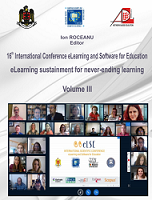IDENTIFYING THE WORK STYLES OF 1ST YEAR STUDENTS FROM UNEFS USING COMPUTERIZED ASSESSMENT
IDENTIFYING THE WORK STYLES OF 1ST YEAR STUDENTS FROM UNEFS USING COMPUTERIZED ASSESSMENT
Author(s): Radu Predoiu, Constanţa-Valentina Mihăilă, Georgeta Mitrache, Alexandra PredoiuSubject(s): Psychology, Higher Education , Health and medicine and law, Sports Studies, Distance learning / e-learning
Published by: Carol I National Defence University Publishing House
Keywords: style; vulnerability to stress; stress; personal development; sport;
Summary/Abstract: Style refers to the significant and specific characteristics through which the uniqueness of personality or aptitudes, various types of capacities is expressed. Psychological vulnerability implies the existence of imbalances that disturb the development and the affective, intellectual, relational activity. Its appreciation is part of the multidisciplinary research and leads to preventive and therapeutic interventions. Stress vulnerability is defined as the characteristic feature of certain individuals, to easily develop stress reactions, towards a wide range of stressors. Although it also has genetic determination, it is constituted throughout the personal history of the individual. The aim of the investigation was to identify the work styles of 1st year students from the National University of Physical Education and Sport Bucharest (UNEFS) in order to facilitate their personal and professional development. At the research participated a total of 93 students from UNEFS, 67 male and 26 female, aged between 19 and 21 years old. In the study we used the SWS questionnaire (Survey of Work Styles) which was applied online through a computerized platform. Dimensions such as impatience, anger, work involvement, time urgency, work dissatisfaction and competitivity (scales of SWS), which directly influence the stress level of the students, were analyzed. Gender differences were also highlighted. Using the t test for two independent samples significant differences were found considering competitivity. After we underlined the profile of 1st year students from UNEFS, separately for boys and girls, in the case of each of the six scales mentioned above, suggestions for personal development have been made.
Journal: Conference proceedings of »eLearning and Software for Education« (eLSE)
- Issue Year: 16/2020
- Issue No: 03
- Page Range: 397-403
- Page Count: 7
- Language: English

